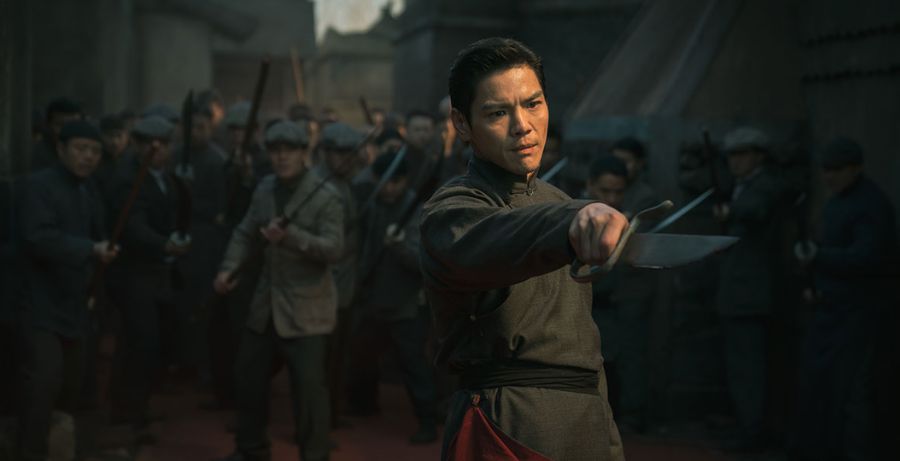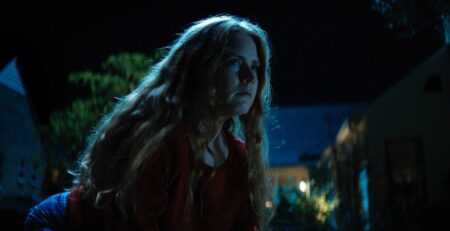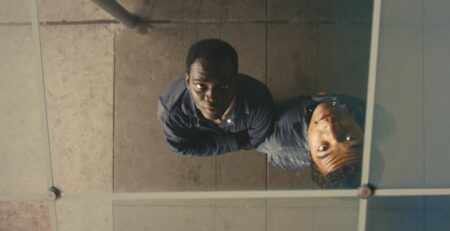Martial arts school politics. Only one death. 100 Yards seems, when described in the barest of forms, to fall short of other martial arts films. Especially in a time where more violent and innovative kills are becoming the (welcomed) standard. But what if I told you it features a nearly 45-minute fight to close out the film as its third act? Yup.
Directed by Haofeng Xu and Junfeng Xu, and written by the former, 100 Yards is set in China in 1920. We follow two students fighting for control of a martial arts school. On his deathbed, the Master of the Tianjin martial arts school calls for combat between his son, Shen An (Jacky Heung), and his best apprentice, Qi Quan (Andy On), to determine who will be crowned his successor. With his father rooting for Qi Quan to win, it’s clear that Shen An desperately wants to be the leader of the school that never planned to have him at the helm.
When Quan easily bests An in single, unarmed combat, the apprentice assumes control of the school and An is humiliated. Taking a fight to the streets where hoodlums and not martial artists fight, An looks to his father’s second in command, Chairwoman Meng (Li Yuan), for guidance. But he doesn’t find the support he wants. Instead, he’s told to become a banker and leave the 100 Yards of the martial arts circle he’s known his entire life.
What ensues is a push and pull for power as An refuses to back down and pushes Quan to keep the fight going, only this time, with weapons. In his attempt to claim the position he believes is his, An exposes secrets and traditions long-held sacred by the peacekeeping institution and creates a chasm in the city. At the same time, Quan is dedicated to expanding martial arts to everyone, hoodlums and Westerners alike, he isn’t to be taken lightly. The duo’s dance for power pulls in the city of Tianjin, and customs give way to adaptions of rules that push past tradition.

As vibrant as it is meticulous, 100 Yards is a modern marvel of a martial arts film that embraces the time period’s fashion to create a visual smorgasbord of aesthetics showcasing the Westernization of Chinese fashion without ever losing Tianjin’s unique cultural architecture and past. The stunning costuming is all chosen to play with expectations and highlight the body as it moves through space to fight, perfectly tailored while still and even more beautiful in movement whether it’s a European or Zhongshan Suits or An’s Changshan elegantly draped into his belt revealing a red lining, every single costume is layered with story.
The costume constantly captures the pushing of the West on Chinese culture, and the ways in which they change each other for the better and the worse. Old and new, son and protege, there is a balance of character throughout the film, and it’s distilled into the imagery of the film that captures what can be done with framing, set design, and cinematography.
100 Yards showcases the visual strength that a period drama can have. 100 Yards embraces Westerns, jazz, and revamps the ascending the pagoda trope to make it a long alleyway where one man fights waves of martial artists. With stunning production design, costuming, and a keen sense of color theory and framing, 100 Yards is art. Throw in sound design that captures the crack of bones, the twip of a fist moving through the air, and even the smallest movement of fabric, and you have an action standout.
Additionally, the choice to include French fighters in the waves of combatants in the climactic one-versus-many fight sequence at the end of the film pushes An’s skill. He is not only using weapons he’s not used to, but he’s also grappling with how to take down an opponent twice his size. The size variance also allows for dynamic action sequence building and framing.

Jacky Heung’s performance is unmatched. With his frustration boiling and his skill filling the frame, Heung’s performance as Shen An is undoubtedly one of the top action performances of the year. At the same time, Andy On is effortless in his push for power and the charisma drips from every close-up of him in his suit and glasses.
Visually, 100 Yards is absolutely stunning. The costumes, the set designs, and every bit of the meticulously crafted scenes to be seen frame by frame with each scene beginning with a slight moment of pause to allow the visuals to steep. In fact, I can easily say that 100 Yards is the most gorgeous film I saw while at Fantastic Fest, with every element thought out and executed with meaning to inform a visual narrative running parallel to what’s shown in dialogue.
That visual language continues in the film’s action duels. The Xu Brother’s have an expert ability to direct and capture fight sequences. Extremely quick with emotive elements, the fight sequences in 100 Yards are jaw-dropping. Long shots are expertly crafted and the choreography is allowed to be the focus of each scene, whether it’s hand-to-hand or the fantastically kinetic Wing Chun’s double knives final gauntlet.
100 Yards is breathtaking. The film is near perfect, with only some mildly confusing moments in the story’s overall mystery, it succeeds beautifully. A period piece, an intimate epic where the past meets the future, 100 Yards is an artful look at martial arts politics and a film that should be seen on the biggest screen.
100 Yards screened as a part of the Fantastic Fest 2023 program and has distribution in North America via WellGoUSA.
100 Yards
-
Rating - 9/109/10
TL;DR
A period piece, an intimate epic where the past meets the future, 100 Yards is an artful look at martial arts politics and a film that should be seen on the biggest screen.





